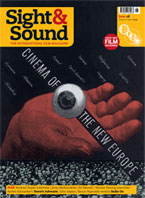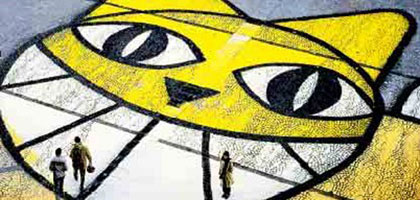
NOZONE - Direct Action Hero
DVD review: French Documentarian Chris Marker

Tim Lucas relishes the work of French documentarian Chris Marker, the 'best-known author of unknown movies'
The Sixth Side of the Pentagon/The Embassy
Chris Marker and François Reichenbach/Chris Marker; France 1967/73; First Run Icarus Films/Region 1; 26/21 minutes; Aspect Ratio 4:3
Happiness/The Last Bolshevik
Aleksandr Medvedkin/Chris Marker; Russia/France 1934/93; First Run Icarus Films/Region 1; 95/116 minutes; Aspect Ratio 4:3; Features: Medvedkin-related extras, including extract from Marker's 1971 film 'The Train Rolls On'
Remembrance of Things to Come
Yannick Bellon and Chris Marker; France 2001; First Run Icarus Films/Region 1; 42 minutes; Aspect Ratio 4:3; Features: 'Colette' documentary by Bellon (1951)
The Case of the Grinning Cat
Chris Marker; France 2004; First Run Icarus Films/Region 1; 58 minutes; Aspect Ratio 4:3; Features: seven short films about animals
He calls himself "the best-known author of unknown movies" and perhaps he's right. At the present age of 86, the pseudonymous French film-maker Chris Marker (Christian François Bouche-Villeneuve) is known primarily for only two films, more widely seen than the rest. One is La Jetée (1962), a sublimely romantic time-travel story told almost entirely in still images (it was later remade, with much additional frippery, as Terry Gilliam's Twelve Monkeys); the other, Sans soleil (1983), is an essay consisting of disconnected documentary footage from Japan and Africa filmed by cameraman Sandor Krasna, tied together by the voice of Alexandra Stewart reading from Krasna's probing correspondence. On the surface, the fable and the essay - released together on DVD by Criterion last year - seem poles apart, yet both are mysteriously non-linear, the better to come to terms with the essence of time and memory; the distance between Krasna and the woman reading his letters is every bit as close yet unbreachable as that between the time traveller and the woman from an earlier age whose image haunts him. Though both films have science-fiction aspects, Marker is a confirmed documentarian allied with the 'direct cinema' movement, so called out of resistance to the term cinéma vérité. Similarly, he dislikes the term 'protest', which he prefers to call 'direct action'.
Bookending these four discs, the first in a welcome series of Marker titles from First Run Icarus Films, are two on the theme of 'direct action'. The Sixth Side of the Pentagon (taking its title from the Zen proverb 'If the five sides of a pentagon appear impregnable, attack the sixth side') attends the 1967 'March on the Pentagon' rally documented by Norman Mailer's Pulitzer Prize-winning The Armies of the Night. Marker's narration praises this occasion, when more than 100,000 Americans made the adjustment "from political gestures to political action", but his camera also captures the ironic theatricality of the event as various factions (the American Nazi Party, self-styled religious leaders, hippies) abuse the common cause for the sake of self-promotion. The co-featurette, The Embassy, is a Super-8 document of various people seeking shelter in an unspecified embassy during a violent revolution, revealed in its last word and image to be an utterly believable work of science fiction.
Public demonstrations also figure prominently in The Case of the Grinning Cat, which explores the parallels between the arrival of 'M. Chat' graffiti art on Paris buildings during the post-9/11 period of US sympathy, and its sudden halting as President Bush declared war on Iraq, changing the mood of the country in extremis. Here, with tongue in cheek, Marker charts the value of indirect, benign political demonstration - vandalism in the dead of night, resulting in these murals of smiling cats - while also revelling in his country's encouragement of 'direct action'. Speaking as an American, and living in a country where public protest seldom occurs any more, or is at least no longer reported by the media, I must say that bearing witness to the political activity in this film, the overstated and the understated, left me feeling happier to be alive than any other film has done in years.
The two other releases are exceptional portraits of artists. Aleksandr Medvedkin's silent comedy Happiness is paired with The Last Bolshevik, Marker's extraordinary study of the director's turbulent life and times which asks how a staunch Stalinist could produce works antithetical to his country's official line, not to mention his own avowed beliefs, and manage to survive to a ripe old age when artists of lesser transgression did not.
Like La Jetée, Remembrance of Things to Come is told entirely in still photos - here taken by photojournalist Denise Bellon (1902-1999), whose daughter Yannick co-directed. It demonstrates how the personal interests of a talented photographer can affect the way world history is remembered. Images from the first surrealist exhibition, the 1937 World's Fair and the origin of the Cinémathèque Française (Bellon photographed the cans of film that Henri Langlois stored in a bathtub) prove Bellon's vanguard credentials, while her wartime photography shows her sensitivity and artistry to be at least their equal. Remembrance is a veritable ribbon of powerful images and may enlarge your world to accommodate a new heroine.
The supporting featurette, made by Yannick Bellon in 1951, finds the novelist Colette rhapsodically reminiscing about the homes where she lived in her youth, until Jean Cocteau drops by for a visit. It's a sheer delight.
